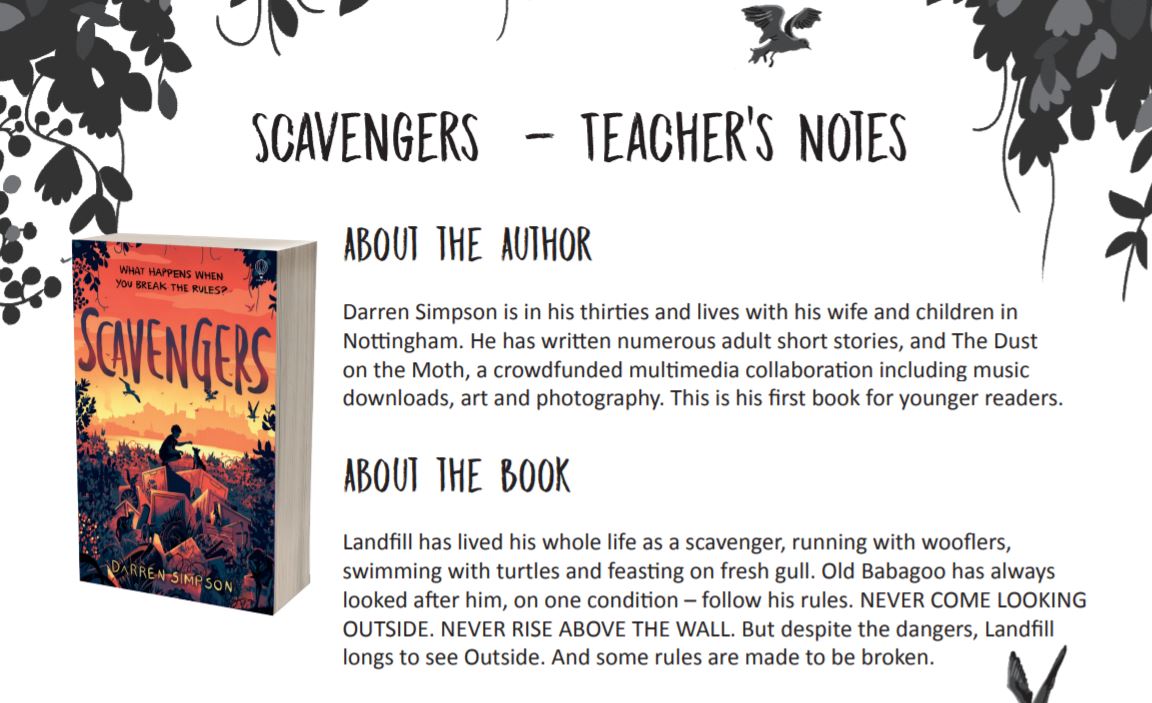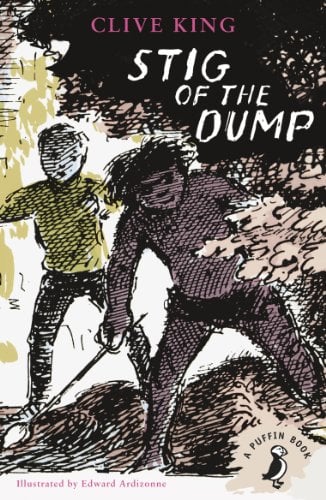Darren Simpson is the author of Scavengers, a grimy, gritty middle-grade adventure about a boy called Landfill. Here he talks about the book’s creation and inspiration…

Without giving too much away, can you tell us a bit more about your new book Scavengers?
Scavengers is a grubby middle-grade adventure about a feral boy called Landfill and his paranoid protector, Babagoo, who hide in an industrial, overgrown wasteland called Hinterland from the Outsiders beyond its walls. In short, I guess I’d call it a junkyard Jungle Book.
The front cover design by Tom Clohosy Cole is beautiful and captures your descriptions of the sky and Hinterland wonderfully! Can you remember how you felt when you saw it for the first time?
I’m so lucky that Tom illustrated the cover. I agree: it’s beautiful. It’s both striking and nuanced, and I think it’s also very true to the novel. I remember very vividly the first time I saw it. Usborne were great because they allowed me to see an early draft so that I could comment on it early on. It was the summer of 2018 and my family and I were heading back to a campsite after a visit to Portmeirion. I spotted the email on my phone and opened it, and when I saw the image I was stunned. I could barely speak as I showed it to my wife. Not just because I loved the art so much, but because that was the moment it really hit home that Scavengers was getting published.

Can you describe the relationship between the two main characters, Landfill and Babagoo?
Landfill and Babagoo have a very complicated relationship that’s as poignant as it is unsettling. Babagoo adores and loves Landfill, as he genuinely sees him as the only good thing left in a very dark and dangerous world. But his love and protectiveness can be extreme to the point of menace. He’s incredibly strict with the rules Landfill has to follow to stay safe in Hinterland, and takes it very badly when Landfill lets him down by slacking. He’s very unpredictable, and can swing between deep affection and playfulness to feelings of disgust and betrayal.
Landfill was raised within the walls of Hinterland, and Babagoo is the only human he’s ever known, which means he doesn’t actually see Babagoo’s behaviour as unusual. He loves Babagoo in return, for he knows how much Babagoo cares about him. But – like any young teen – Landfill becomes sullen when he’s told off, and as he gets older he begins to question his guardian’s authority.
Babagoo is a very interesting, complex character – I was never quite sure of his motives, his grip on reality and how much of what he reveals is the truth. When writing, did you have a back story for Babagoo? Why do you think he’s so scornful of the outside world?
My first draft included a backstory revealing what caused Babagoo to take refuge in Hinterland. He also suffers from a schizoid personality disorder, which explains a lot of his behaviour, although this is never stated explicitly. When Landfill became the central protagonist in later drafts, I decided not to be so specific about Babagoo’s past. The main thing to take away from Babagoo is that there are things wrong with the world that can force people to either turn their backs on it, or to simply end up abandoned.
It felt at times as if you might be commenting on modern society and the way society has become consumed by social media and money. What aspects of modern life do you enjoy? What aspects of today’s society do you think are dangerous or damaging?
I’m hugely blessed and enjoy so much of modern life. The little things, mostly: spending a Sunday in the woods with my wife and boys, having a coffee with friends, discovering new music, playing drums with old bandmates… And writing, of course.
In terms of the dangerous or damaging aspects of modern society, where do you begin? You mention social media and money, so I’ll focus on those.
We all know that social media – and the internet in general – is a double-edged sword. I love the fact that, to certain extents, it gives everyone a voice, allows public dialogue and democratises creativity. I think it’s amazing that you can not only produce things like music, stories, art and films more affordably than ever before, but can also put them online for the entire online world to access. But at the same time, of course, the internet and social media can be exploited to project malicious voices, bully anonymously, warp facts, encourage division and create echo chambers for hate.
Money is fine as a practical method of exchange. But the imbalance and unfairness it’s involved in… That’s what bothers me. I find it genuinely absurd that in wealthy countries like the UK, someone can spend thousands of pounds on a pair of designer cufflinks, while someone somewhere else has to queue up at a food bank to get as basic a necessity as food. And this rarely has anything to do with a person’s goodness, skill or intelligence; it just comes down to what you’re born into – to the luck of the draw we call life.
The darker side of social media, money and anything else is usually a manifestation of the same old things: division, fear, hate, injustice, greed, hypocrisy. I’ve touched upon this in Scavengers, although I’ve tried to provide balance by also highlighting what’s special about society, people and community. Because that’s how society appears to me: flawed, unfair and often terrible, but also miraculous, inspiring and wonderful. There’s always light against the dark, from kids taking action against climate change, to someone giving their seat up for someone more in need on the bus.
Babagoo demands that Landfill obey his many rules while they live together in Hinterland. What rules would you like your own children to follow in life? Are there any rules that you try to live by?
The main thing my wife and I try to encourage in our sons is respect and empathy for other people; to try to make life better for others, rather than worse. That’s what all our rules boil down to, I guess. I try to do the same: to be good to people, and to hope they’ll be good to me too. Although I realise life doesn’t always bend to fit such simple rules.
Landfill and Babagoo speak in a very idiosyncratic manner, and communicate using lots of strange words. What inspired this? How important is this strange language to the story?
It was actually my agent, Laura Susijn, who pointed out in an early draft that perhaps, in light of Babagoo and Landfill’s insulated environment, they might not talk all that “normally”. It was an excellent point, and I had a huge amount of fun playing with words and body language. I got carried away, and before I knew it had developed an elaborate lexicon that not only highlighted the closeness between Landfill and Babagoo in their shared isolation, but also helped to give Scavengers a distinctive “Hinterlandish” flavour.
There’s an important scene in Chapter 7 where Landfill climbs to the top of the wall and sees Outside for the first time. Can you talk us through this scene? What might Landfill be thinking and feeling at this point in the story?
That’s a tricky one, as there’s so much going through Landfill’s head that even he can’t fully comprehend it. After a lifetime of having a wall as his horizon, seeing the world stretch out further than he’d imagined possible has a genuinely physical effect on him – a kind of horizontal vertigo that makes him lose all bearings of what’s up or down. On a more emotional level, Landfill is intimidated by the vastness, but is also inspired and excited by its lack of limits or boundaries. Seeing how big the world is beyond Hinterland makes him realise how small and enclosed his life has been. This plays a major part in encouraging him to question the way he’s always believed the world to be, and to wonder about perhaps making his own world bigger.

Through his relationship with Dawn, Landfill experiences lots of things for the first time. Can you remember something recently that you experienced for the first time? What was it? How did you feel?
Going back to the positive sides of technology and the internet, my most recent new experience has been moving – quite late, admittedly – from buying albums on CD to streaming music. And I’m absolutely loving it. I thought wouldn’t, as my habits of saving up for and listening to new music were very set in their ways. But suddenly I no longer have to wait to hear an album or explore an artist. It’s just all there for me, whenever I want it – a whole world and history of music at my fingertips. It’s honestly blown my mind, and I get still excited about it every day. Which goes to show: you don’t know what you’ll like until you try it. Sometimes you don’t know yourself as well as you think.
All the animals in the story are named after famous authors. Did you have a favourite author when you were a child? Why?
I find it hard to pin down a specific author. I spent a lot of my reading time flitting between books about monsters, myths and legends and the horror novels on my mum’s bookshelf. But I guess Roald Dahl was always a constant. I loved his children’s books for their fizz and language. They’re just so…Roald Dahl. He’s one of those authors you can use as an adjective. And as I got a little older I started to really enjoy his short stories for adults. They’re so mischievous, sly and morally grey, and also very sinister – sometimes to the point of being gleefully malicious. And when you read his children’s books as an adult, you see that those qualities were always there.
As I was reading, I picked up echoes of Stig of the Dump and The Jungle Book. I was also reminded of The Tempest by Shakespeare – the power struggle between Caliban and Prospero reminded me of Babagoo’s and Landfill’s relationship. Caliban’s description of the island (“Be not afeard; the isle is full of noises, Sounds, and sweet airs, that give delight and hurt not.”) reminded me of the beauty and tranquillity that Babagoo is seeking and trying to protect. Did any of these stories affect or influence your writing?

Stig of the Dump comes up a lot when people talk about Scavengers, and it’s really interesting that you picked up echoes of The Tempest. I read both of them a very long time ago, and they weren’t a conscious influence. But they may have lingered at the back of my mind and played their part; I do believe that happens when you’re creating anything.
The Jungle Book was a very strong influence. When I realised I was writing about a feral boy who sees animals as equals, I figured it was about time I read The Jungle Book. The Mowgli stories gave me a lot of ideas; the first draft even had a white snake inspired by Thuu, the Jungle Book’s less famous snake and a great character. But the thing that really struck me about Mowgli was the way he saw the jungle animals as civilised and humanity as savage. It’s a really interesting inversion that ties in with some of the comments I made about society earlier, and that notion definitely became a big part of Scavengers.
Hinterland is quite a complex web of places and names. How did you design the setting? Did you have to draw a map of what Hinterland looks like in order to help you describe the various places and hideaways within it?

My imagination has its limits, so I ended up basing Hinterland on a coal-processing plant in Wales called the Cwm Coke Works, which closed down several years ago. I used online photos taken by urban explorers to map the layout and develop landmarks, and was hugely inspired by the way nature – moss, weeds and the like – was reclaiming this abandoned industrial plot. That’s something I turned up to eleven by adding tons of colourful flora, along with the wild animals that keep Landfill company. And, for the purpose of the story and its themes, I also added an intimidating boundary wall, topped with broken glass and smothered in vines and nettles.
The language in the story is often very lyrical. I particularly liked your descriptions of the changing sky throughout the story, which in one sentence you describe as ‘honey-yellow with dawn’. Do these striking images come to you naturally or do you have to spend a lot of time working on your sentence construction?
I guess it must be a little natural in that I try not to work too hard on descriptions. If I’m having to labour over a description, something’s wrong and it’s not going to work. There are just places in the story where I feel the reader needs to settle into the moment and soak up some atmosphere. So I put down what comes into my head, and try to make it interesting enough to not be generic or dull, while also not being so try-hard that it’s forced or ruins the rhythm. Then I’ll re-visit it later. If it still sounds okay, it stays.
There’s an awful lot of twists and turns throughout the story. I was never quite sure what I was reading or what was going to happen. Did you enjoy plotting all these surprises?
I did enjoy it, although at the same time it was probably the hardest thing to do when writing the book. I tend to plot in a lot of detail before I start writing, so I knew all the twists and surprises and where the story was heading. But it’s a bit of a tightrope walk: holding enough back to keep the reader driven by questions, while not being so obscure that the reader is confused or stops caring. It’s like laying down a breadcrumb trail, in which every crumb has to be in just the right place.
Do you think Landfill and Dawn will return in another adventure or are you happy with where you’ve left them?
I’m happy with where they are, and will leave anything that happens next to the reader’s imagination. The effect of the ending is intentional and very important to me. I’d like to keep Scavengers self-contained and move on to my next middle grade novel, which I’m now some way into writing – and very excited about!
What do you hope readers will take away from Scavengers?
“A lot of people have commented on the grey areas in the novel, and again, that’s very intentional. Life, society and people are such complex, contradictory things, and I find questions a lot easier than answers. But that’s what I’d like readers to take away from Scavengers: that things need to be questioned and explored, rather than readily accepted.”
This applies particularly to the likes of hate, fear and division. Scavengers isn’t just about the tall wall that surrounds Hinterland. It’s about the cultural and psychological walls built around children by people who tell them what they should fear and who they should hate; it’s about breaking down those walls and seeing for yourself.
Finally, can you describe Scavengers in three words?
I’m sure readers will be much better at that than me! But if I had to choose three I’d go for the following, based on what readers so far have said: icky, poignant and compelling.


